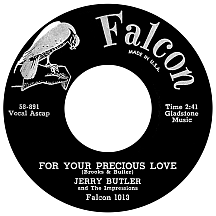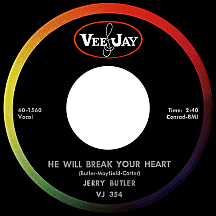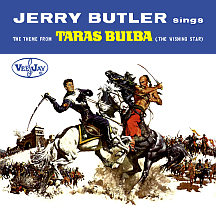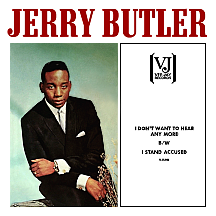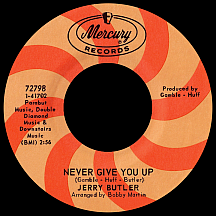JERRY BUTLER
A few years into his solo career, Jerry Butler, an established nightclub headliner with several hit records to his credit, suddenly found himself in a tough spot during a performance at Philadephia's Uptown Theater. Due to an electrical malfunction, Jerry's microphone didn't work and the band was unable to back him properly. But he sang anyway, taking a chance that the acoustics in the modest-sized venue would allow everyone in the crowd to hear him. What the audience experienced was a clear, completely unenhanced a cappella vocal performance. The reaction to this unusual approach came off as nothing less than overwhelming. Afterwards popular WDAS personality Georgie Woods, who'd booked him and witnessed the quick-thinking display of pure talent, raved about how "cool" it was. Then he started calling Jerry "The Ice Man" on his radio show...and the nickname came to define him as an artist.
During his infancy, Butler's family moved to Chicago from his birthplace, Sunflower, Mississippi. He was exposed to music in church and took a more active interest around 1953 after meeting Curtis Mayfield; 13-year-old Jerry was about three years older than Curtis. Within a few years they were members of The Northern Jubilee Gospel Singers, which included three of Mayfield's cousins. While in high school, Jerry sang with a doo wop group, The Quails, and Curtis was with The Alphatones. Later they came across a transplanted vocal trio from Tennessee called The Roosters (Sam Gooden and brothers Arthur and Richard Brooks); the fit seemed right and The Impressions were on their way. A local music manager, Eddie Thomas, secured bookings for the act at local dances and one great song stood out: "For Your Precious Love," a heartfelt ballad penned by Brooks and Butler.
Thomas succeeded in placing The Medallionaires, another Chicago group he managed, with the larger Mercury label, but their one and only single, "Magic Moonlight," didn't pan out. Meanwhile, Vee-Jay Records owner Vivian Carter signed the Impressions to a contract; Jerry's lead vocal was so prominent on "For Your Precious Love" that she changed the billing to Jerry Butler and the Impressions, the decision creating discord among the group's ranks. In retrospect, it turned out to be a favorable move for everyone involved, ultimately expanding one act into two very successful ones. The single, released on Falcon (the label was quickly renamed Abner, after company exec Ewart Abner), caught on right away but was more than just a hit; it became a classic of the doo wop genre, recognized as such at the time and ever since, synonymous with romance and remade by scores of singers and musicians. As a bonus, the driving, uptempo flip side, "Sweet Was the Wine," gave record buyers a better value than they'd bargained for.
The next single, "Come Back My Love" (with reversed label credit), written by Roy Hamilton and Clyde Otis, duplicated the structure of the first hit and as a result barely reached the charts. Third effort "The Gift of Love," credited solely to the Impressions but with a pleasingly emotive performance by Jerry, failed to find an audience. Perhaps the initial lead billing had gone to Butler's head; with Viv's blessing he left the group to go solo. The Impressions went on without him and Fred Cash came on board, though Curtis took over as lead singer. Four Jerry Butler singles surfaced on Abner in 1959 and early '60; "Lost," a midtempo offering featuring a flute solo by James Spaulding (the great jazz saxophonist caught in the act of expanding his repertoire), and Calvin Carter's overly sentimental "A Lonely Soldier" made respectable chart showings.
In the process of phasing out the Abner label, Jerry was moved to Vee-Jay. He and Curtis (whose Impressions had been struggling) began collaborating, the result being a major hit that arguably still stands as Butler's signature song. "He Will Break Your Heart" contains lyrics that put the singer in the painful role of jilted lover ('Fare thee well, I know you're leavin'...for the new love that you've found...'), an approach that connected with music fans in a big way; the single spent seven weeks on top of the R&B charts and reached the pop top ten. Mayfield sang background harmony on this and the next two singles (also penned by the pair and recorded during the same session), "Find Another Girl" (mom provides an answer to the previous hit) and "I'm a Telling You," a commentary on a working man's hardships ('...my way gets darker, an'-a my...work gets harder'); social commentary of this sort would crop up often, particularly on Mayfield's soon-to-be-strong-selling Impressions recordings. Both songs reached the R&B top ten and pop top 30 in 1961's middle months.
In one of many surprising developments, Butler indulged his love of movie themes and did a cover of a rather outstanding one, "Moon River." Composed by Henry Mancini and Johnny Mercer, it was performed by Audrey Hepburn (sitting on a fire escape window, strumming a guitar) in one of her most popular films, Breakfast at Tiffany's (big box office and a multiple Oscar contender). Unlike Audrey's casual rendition and nowhere near the orchestra-and-chorus style of Henry's original, Jerry's version had a prominent guitar arrangement (similar to Dee Clark's then-prevailing "Raindrops," also produced under the Vee-Jay masthead) and competed head-to-head with Mancini's (in late '61 both singles peaked at number eleven; Butler got there first), in addition to a mega-selling album version by Andy Williams.
After this, material from other outside songwriters held more appeal. Burt Bacharch and Hal David (already successful but nowhere near the crazy level they would be at a few years later) submitted "Make it Easy on Yourself" ('...breaking up...is so very hard to do'), its message similiar to "He Will Break Your Heart." It hit the top 20 in the summer of '62. The five-straight hit streak ended with the next single, "You Can Run (But You Can't Hide)," then another movie theme, Franz Waxman's "The Wishing Star" from Taras Bulba, a historical action flick starring Tony Curtis and Yul Brynner, sold poorly despite excellent production values and Butler's typically strong vocals.
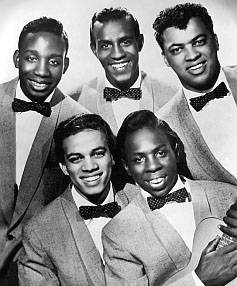
Jerry was a regular in the mid-chart regions for the next couple of years. The 4 Seasons' VJ brainiacs Bob Gaudio and Bob Crewe furnished "Whatever You Want" and Mayfield (on track with the Impressions by this time, building a string of hits on ABC-Paramount) gave Jerry his biggest hit of 1963, the infectious "Need to Belong," another top 40 hit and his highest-charting R&B single since "He Will Break Your Heart." His 1964 output, all ballads, consistently ranked high on the rhythm and blues surveys. "Giving Up on Love" preceded an early Randy Newman composition, "I Don't Want to Hear Anymore," and its flip, "I Stand Accused," another top ten R&B single penned by Jerry and his younger brother Billy, who would soon enjoy a nice string of modestly popular singles heading up Billy Butler and the Chanters on Chicago's hot soul label, Okeh.
Vivian and Calvin figured the time was right to team Vee-Jay's top male vocalist with recently-hot female star Betty Everett ("You're No Good," "The Shoop Shoop Song"). The two had one thing in common: their home state, Mississippi. "Let it Be Me," a French song by Gilbert Becaud and Pierre Delano (Mann Curtis supplied the English lyrics) had been a tremendous hit for The Everly Brothers in 1960; the blend of Betty's and Jerry's voices clicked and the single went even higher in the top ten than Don and Phil's version. On the R&B charts it hit number one...one of the year's biggest singles. They reached back much further for "Smile," the Charles Chaplin-Geoffrey Parsons-John Turner classic that had been recorded by countless singers since its debut in the 1936 film Modern Times; though the single was only a minor hit, it completed a strong year for Jerry and the peak year of Betty Everett's career.
Vee-Jay went bankrupt in 1966, an unfathomable notion considering the stroke-of-luck licensing deal for The Beatles' early Parlophone recordings that had fallen into the Carter family's laps three years earlier, in time to make millions for the company...in addition to the 4 Seasons' massive sales...and the not-so-humdrum hit streaks by Clark, Everett, Jimmy Reed, Gene Chandler...and the everlovin' Ice Man. Yet the once-lucrative operation went south. Jerry, who'd co-written "I've Been Loving You Too Long" with close friend Otis Redding (released on Volt in 1965, it became Otis's biggest hit during his brief lifetime), signed with a much bigger Chicago-based label, Mercury (though most of the recording dates were held at Bell Sound in New York). At first he worked with staff producers and arrangers; Luchi DeJesus achieved solid results with "Love (Oh, How Sweet it Is)," but it didn't translate into airplay or sales. The big label vibe didn't feel right and Jerry considered breaking his contract, but he figured he'd stick it out awhile after "I Dig You Baby," his take on a soulful Lorraine Ellison ballad from '65, made it into the R&B top ten in early '67. "Mr. Dream Merchant," a Jerry Ross production, had similar results near year's end. Then the stars aligned: Kenny Gamble and Leon Huff entered the picture.
Philadelphian Gamble got into the business in 1963 as a singer with "You Don't Know What You Got Until You Lose It," which he'd written with Ross. Over the next few years, Kenny recorded for Epic, Columbia and Arctic, but had more luck as a producer and/or arranger, starting with his and Joe Renzetti's work on the early '64 hit "Who Do You Love" by Philly trio The Sapphires. Over the next year, he cut his teeth on Cameo-Parkway acts The Swans, Candy and the Kisses and Dee Dee Sharp. Then he and Jerseyite Huff formed what became a permanent partnership; they'd been running the independent Gamble label a short time when the affiliation with Butler commenced. "Lost," a different song than Jerry's 1959 tune on Abner, was recorded in N.Y. at about the time "Mr. Dream Merchant" made its impact; it was the first single from The Ice Man Cometh (its title taken from Eugene O'Neill's famous 1946 Broadway play), the "Philadelphia Sound" LP that revitalized Jerry's career.
The remainder of that album's eleven tracks were actually created in the City of Brotherly Love, as Kenny, Leon and Jerry set up shop there, recording "Never Give You Up" and "Hey, Western Union Man" at the Cameo-Parkway studio. Those two hits (the latter Jerry's third to top the R&B chart) reestablished him at the forefront of romantic soul singers while affixing the "Ice Man" image into the public's consciousness. Most of the album's songs were written by Gamble, Huff, Butler and/or Thom Bell, another Philadelphia luminary (and key player at the time in building the separate Philly Groove brand of soul with "La-La-Means I Love You" by The Delfonics). Jerry's fourth Ice Man single, "Are You Happy," came out of a session at Sigma Sound Studios near the end of summer '68 and continued the top 40 streak. The somewhat-pieced-together album sounded incredibly consistent throughout. The fifth single, "Only the Strong Survive," became the biggest of the batch in spring 1969, returning him to the top ten and marking his fourth number one R&B hit.
Further creative collaborations and meticulous tapings at Sigma Sound kept the hits coming; "Moody Woman" and "What's the Use of Breaking Up" put the consecutive top 40 pop/top ten R&B count at six; "Don't Let Love Hang You Up" came close to that level, capping two big years for Butler. These hits appeared on the obvious follow-up LP, Ice on Ice, which sold nearly as well as its predecessor. In late '69, after the Gamble-Huff-produced "I Could Write a Book," the leadoff single from what was to be the team's third album with Butler, You and Me, the producing pair left in a tiff over royalty percentages. Donny Hathaway took over for them, but the momentum was lost.
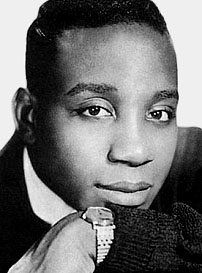
Butler's difficulty in finding a suitable replacement for his departed compadres motivated him to start the Jerry Butler Songwriters' Workshop, a Chicago-based nonprofit project aimed at developing young talent; the Chappell publishing company was so impressed that its owners donated more than 50 thousand dollars to keep it going. A number of talented young go-getters came out of the project that had begun in early 1970, including Terry Callier and Larry Wade, who helped The Dells find continued success after 20 years in the business, Chuck Jackson and Marvin Yancy, who assembled The Independents ("Leaving Me") and had a hand in placing Natalie Cole ("This Will Be") on her road to superstardom, and Leon Ron Hanks and Zane Grey, whose "(Every Time I Turn Around) Back in Love Again" was a million-selling hit for L.T.D. in 1977.
"You Just Can't Win (By Making the Same Mistake)," a duet with Gene Chandler (as Gene and Jerry), made little impact but got Jerry going on the vocal collaboration idea that had worked so well several years earlier with Betty Everett. 24-year-old Brenda Lee Eager had grown up singing in church in Mobile, Alabama; her group, The Piperettes, worked as backing vocalists on some of Jerry's hits and the two got together on "If it's Real What I Feel," a top ten R&B hit in late '71. Billed as Brenda Lee, she added her last name afterwards to avoid confusion with the more famous Brenda Lee. In 1972, "Ain't Understanding Mellow" earned the duo a gold record and a remake of The Carpenters' smash "(They Long to Be) Close to You," penned nearly a decade earlier by Jerry's "Make it Easy" buddies Bacharach and David, sent them back into the R&B top ten. With these accomplishments and a few solo singles under her belt, Brenda eventually returned to backing vocal work, singing behind countless music stars over the years.
A 1972 remake of Gamble and Huff's "One Night Affair" (The O'Jays had scored with it in '69) was Butler's last notable single on Mercury. He left the company in 1974 and kicked around a couple of years before making his way to Motown, debuting there in '76 with an edgier vocal sound on "The Devil in Mrs. Jones" and making his biggest splash with "I Wanna Do it to You," a smooth ballad hit, bucking 1977's prevailing disco trend. Gamble and Huff had gone bigtime with their Philadelphia International label and Jerry hooked up with them in '78, giving in to the power of the glittery dance hall ball with "(I'm Just Thinking About) Cooling Out."
In the 1980s Jerry became politically active, taking a longstanding position as a County Commissioner in Cook County, Illinois. His artistic career has thrived as he's embarked on regularly-scheduled concert tours, sometimes appearing as a frontman for classical symphony orchestras! He began as a balladeer, his baritone voice blessed with a natural, minty-fresh coolness that has deteriorated little over six decades. With apologies to playwright Eugene O'Neill, the "Ice Man" nickname fits Jerry Butler better than anyone.
NOTABLE SINGLES:
- For Your Precious Love - 1958
by Jerry Butler and the Impressions / - Sweet Was the Wine - 1958
by Jerry Butler and the Impressions - Come Back My Love - 1958
by The Impressions featuring Jerry Butler - Lost - 1959
- A Lonely Soldier - 1960
- He Will Break Your Heart - 1960
- Find Another Girl - 1961
- I'm a Telling You - 1961
- Moon River /
Aware of Love - 1961 - Make it Easy on Yourself - 1962
- You Can Run (But You Can't Hide) - 1962
- (Theme from) Taras Bulba (The Wishing Star) - 1962
- Whatever You Want - 1963
- Need to Belong - 1963
- Giving Up on Love - 1964
- I Don't Want to Hear Anymore /
I Stand Accused - 1964 - Let it Be Me - 1964
by Betty Everett and Jerry Butler - Smile - 1964
by Betty Everett and Jerry Butler - Good Times - 1965
- Just For You - 1965
- Love (Oh, How Sweet it Is) - 1966
- I Dig You Baby - 1967
- Mr. Dream Merchant - 1967
- Lost - 1968
- Never Give You Up - 1968
- Hey, Western Union Man - 1968
- Are You Happy - 1968
- Only the Strong Survive - 1969
- Moody Woman - 1969
- What's the Use of Breaking Up /
A Brand New Me - 1969 - Don't Let Love Hang You Up - 1969
- Got to See if I Can't Get Mommy (To Come Back Home) - 1970
- I Could Write a Book - 1970
- You Just Can't Win (By Making the Same Mistake) - 1971
with Gene Chandler (as Gene and Jerry) - If it's Real What I Feel - 1971
by Jerry Butler featuring Brenda Lee - Ain't Understanding Mellow - 1972
by Jerry Butler and Brenda Lee Eager - (They Long to Be) Close to You - 1972
by Jerry Butler featuring Brenda Lee Eager - One Night Affair - 1972
- The Devil in Mrs. Jones - 1976
- I Wanna Do it to You - 1977
- Chalk it Up - 1977
- (I'm Just Thinking About) Cooling Out - 1978


